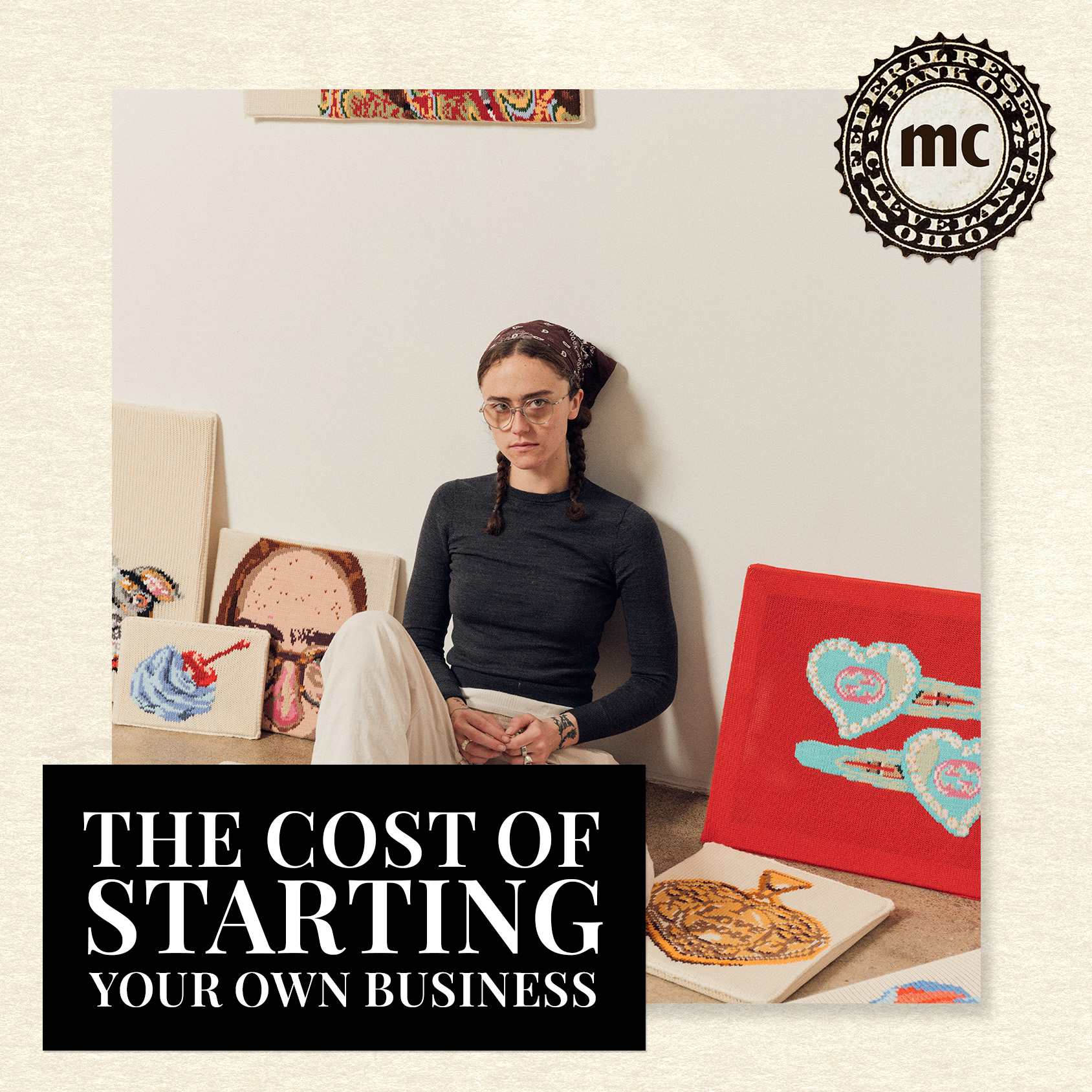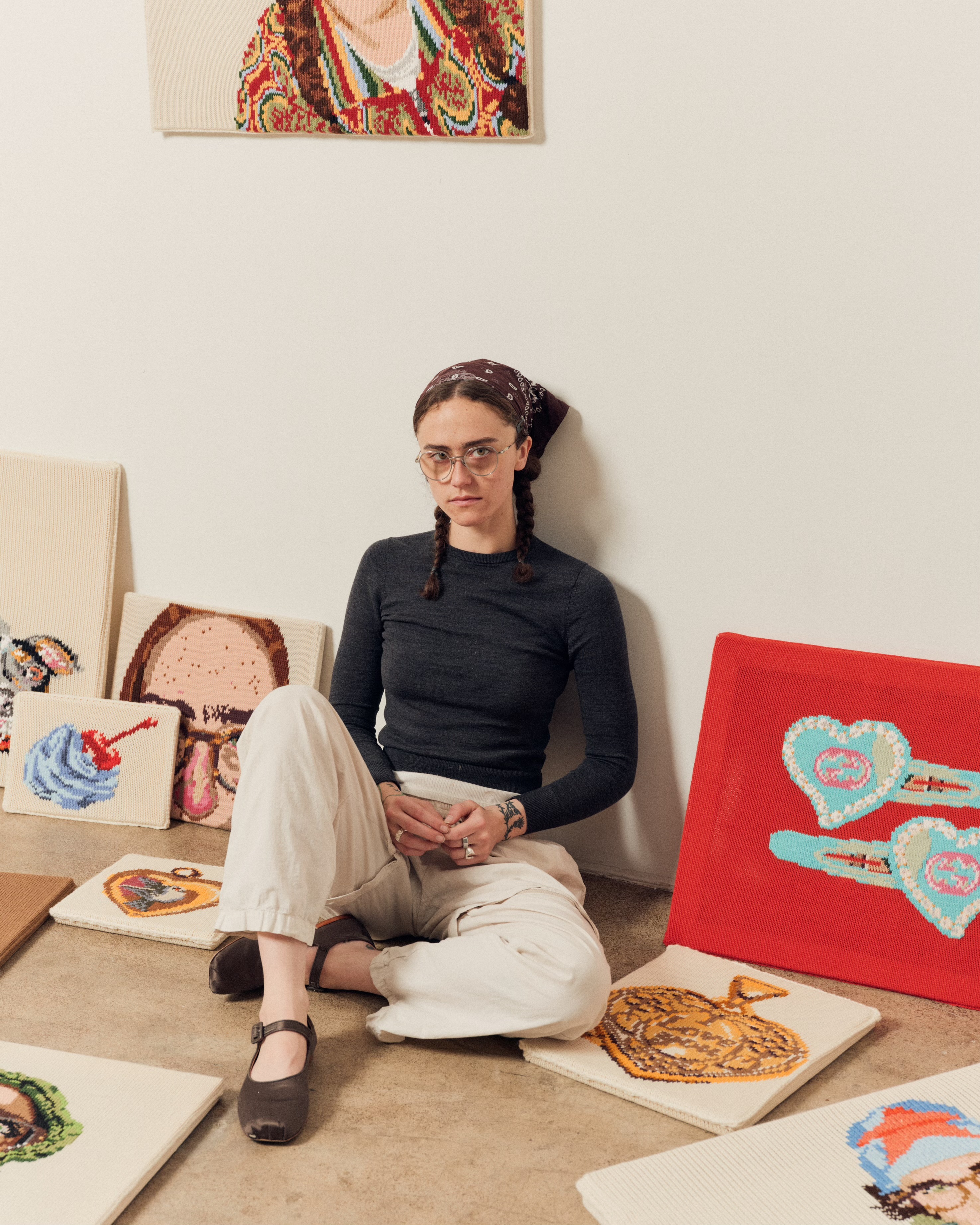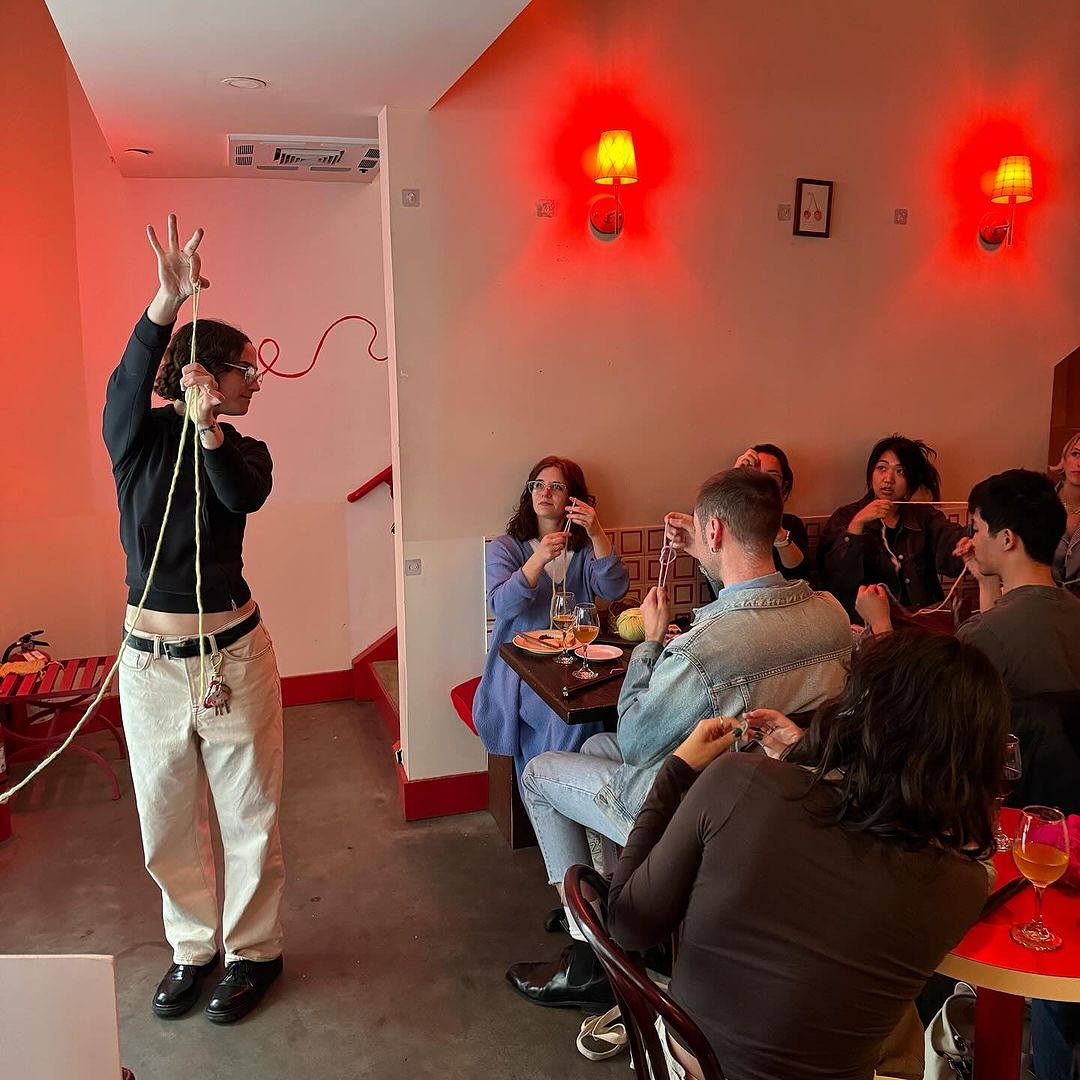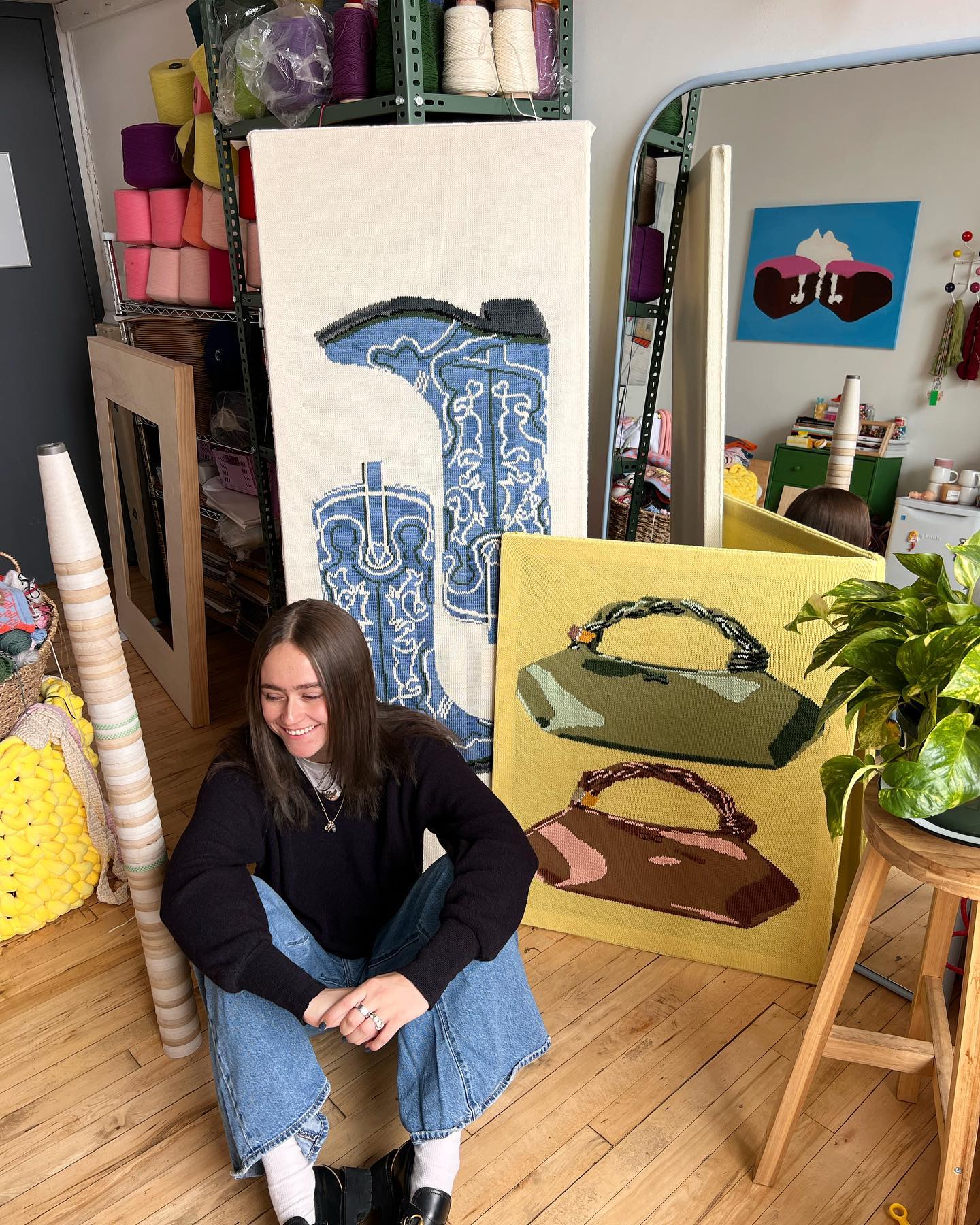
The Cost of Starting Your Own Business talks to founders to get an honest look at what it really takes to create a company. Not just the financial, but the personal and emotional costs, too.
You can use many epithets to describe Ella Emhoff. She's the stepdaughter of Vice President Kamala Harris—and come November, potentially the first daughter to POTUS. She's a fashion model, with Balenciaga and Miu Miu on her runway resume. And the internet has crowned the 25-year-old a certified It girl. Emhoff substantiates the latter title on a video call with Marie Claire, tuning in wearing a perfectly worn-in white tank top and a kitschy-cool beanie she made herself.
But going forward, Emhoff would like you to lead with this: artist, designer, and founder of the knitwear brand and crafting club Soft Hands. "No matter what, I'm always going to be connected to my family and modeling—it's a part of my history. But it feels really good to execute an idea I've had for a while and have it exist as its own thing," Emhoff says from her apartment-cum-studio in Brooklyn, New York.
She jokes that her entrepreneurial endeavor is a coming-of-age trope—"It's the classic, 'I'm 25. My frontal lobe is forming, so I'm doing my own thing now.'"—but she's earnest about how meaningful it is to pursue her passion for fiber arts. "It feels like I'm setting up for a more true-to-myself path. It's very liberating."

Emhoff remembers the first time she picked up a set of knitting needles with impressive recall: "My mom taught me how to knit at a Disneyland hotel when I was six years old with some kit from Target." She explains that "young Ella was a very crafty kid who just couldn't sit still," and knitting was a tool to tame her hyperactivity and force her to focus on the task at hand. The hobby stuck: Emhoff continued knitting as an anti-anxiety and de-stressing outlet throughout her childhood and later honed her practice at Parsons School of Design by studying fine arts and textiles.
She launched her knitwear collective Soft Hands in 2021 and has stayed busy ever since. The artist staged her New York Fashion Week debut in February 2023 with "Ella Emoff Likes to Knit," a pop-up presentation of mohair maxi gowns, chunky balaclavas, and sweater vests. She exhibited her knit "paintings" of Gucci hair barrettes and Sandy Liang Mary Janes at Gotham, a woman-owned art gallery-slash-weed dispensary in Manhattan this past spring.
Emhoff has also been selling out cozy wine bars for her Knit Club, where she teaches beginners the basics and cultivates a "third place" for people to gather. "A big part of my ability and inspiration to make knitwear is through community," she says. "So many formative moments [as an artist] come from the people you meet and the work you create in group settings. A lot of people coming to the [knit] clubs want that sense of place."

Emhoff is still that creative, can't-sit-still kid at her core, piling as many activities onto her plate as possible. "I can't stop doing and making things. My poor dog is always biting my ankles, like, 'Sit down, please. Stop putzing.' But I can't help it—it's my brain. I'm like a rabbit," she says. It makes sense: when you finally prioritize your passion and allow it to bloom, you can't trim or tamper with its natural growth. "There's so much more fun stuff coming with [Soft Hands] in the next year," she says with an ear-to-ear smile. "All I have to say is: get pumped."
Ahead, Emhoff speaks about using one career to fund another, getting a serendipitous endorsement from an A-lister, and taking care of her knitting-induced tendinitis.

I made a pair of striped pants for a final project in my machine knitting course at Parsons and posted them [online]. People were interested in them, so I started my business by selling those striped pants. For basically all of the pandemic, while I was quarantining in Los Angeles, I worked 10 straight hours a day making pants and, boy, was it hard. I was very naive back then about what it took to take a business from, 'Oh, I'm in college and selling pants’ to ‘Oh, now I'm out of college, and I'm trying to build an actual brand.’

[Modeling] was not my plan. I sort of fell into it. [Emhoff was signed to IMG Models after going viral for wearing a crystal-embellished, checkered Miu Miu coat to President Biden’s 2021 inauguration.] As I started getting more modeling work, I saw it as a job I could use to push my knitwear forward financially.
I didn’t want to get loans for my business because I didn't know if I was in it enough. I was still figuring out if I could actually make my art into something—if my knitwear was something that I wanted to put all my time and effort into. I met with wholesalers, but the product minimums were very high, and since I was doing all my own production, that quickly became impossible. So, I kept modeling because it was a good stream to keep pushing through with the brand. If I hadn't had that money coming in, I wouldn't have moved forward like I did [with Soft Hands].


I am a baseline highly anxious and sensitive person. I'm also a one-woman show, and it’s very stressful when you're trying to build a scalable brand by yourself with your own funding and you don't have anyone to riff off of. You have to be really strong to handle the feelings that come up when you spend so much time on a product and list it for what you feel it's worth, and it doesn't sell. Or, the opposite: I spend so much time working on my pieces—some of them take 50 hours to make—and knitting is such a therapeutic and intense process. My apartment is my studio, so I’m surrounded by all of my pieces all the time, and they're such a comfort [to me]. But then I sell them, and they become a part of someone else's story.
Having your likeness attached to your work also takes its toll. [Modeling] is not for the faint of heart. It's just so intense—it makes you the way you make money. It's hard on the self, and I couldn't handle it. [Modeling] was not a world that I could comfortably work in. I couldn't remove myself from my knitwear work and be the faceless person behind [Soft Hands] because my modeling was always connected to the brand. Now that I'm stepping out of the fashion space and not modeling as much, there's less pressure. I can now be more behind the scenes [with Soft Hands], and it's already feeling a lot better.

I developed tendonitis in my wrist because I was knitting so much. A classic visual is me at my knitting machine wearing two wrist braces.
I'm excited to lean into more gallery work because it lends itself to you doing your thing, letting it sit in the exhibit, and then you can make the other thing. It brings more baby steps. And my wrists need the baby steps.

Last night, I went to a dinner event and was seated next to Katie Holmes. She was so lovely and asked me a lot about knitting. I told her about [Soft Hands Knit Club] and how I take yarn donations from people, specifically from a lot of older women's yarn stashes. She was like, “Oh, my mom knits! I'm going to get in contact with you, and I'll send [her yarn] over so you can add it to your pile.” It was surreal. Katie Holmes was not on my bingo card of people to send me yarn.

At the beginning of Soft Hands, I had a lot of meetings with brand designers. They told me there are two parts to having a brand. There's creating the look, the product, and the brand ethos—its identity, story, and character. Then, there's the other part, the business side—the emailing, managing, and hiring of new people. As the brand owner, you have to decide: Are you going to stay on the creative side, or will you be the owner and relinquish [the creating] to someone else and be on the business side?
That really stuck with me because when I started [Soft Hands], I was doing a lot of the admin work when I wanted to do the actual making of the product. [Those conversations] made me restructure what my brand is. I realized I could bring all the different facets of my knitwear journey, my art, and my business into one creative endeavor. Now, [Slow Hands] is less of a knitwear clothing brand and more of a creative studio that does knitwear, gallery art, and graphic design. It feels nice to take a step back and think less about the short-term goals and more about how I want to see this knitting thing grow in the long term. What steps can I take to see the bigger picture rather than, 'Oh, I need to make a collection, figure out wholesale, and get on X, Y, Z retailer site.'


I never thought that I wanted to do knitwear professionally—it was something I just wanted to do for myself. It’s been tough to balance [knitting] being what I love to do with it now being what I do for work. I try to treat the projects as a hobby and not think about it so much as I'm monetizing my craft. To think of it more as, ‘I'm making these pieces, I'm doing these clubs, I'm doing all of this stuff, and it just happens to be my job.’ If I think of it the other way, it takes the fun out of an already repetitive, long, and physically strenuous task.
There was a point when it had gone too far in the work direction, and I wasn't making stuff that I liked or that felt true to what I wanted to do. It felt like I was working all the time and putting myself and a lot of resources into something that I didn't even want to do. Now, it’s more of my craft and career morphing together as a positive thing because I know I'm really lucky to do what I love every day as a job and to experiment and be goofy with it.

The day I released my first collection online was a little dramatic and tear-filled. [The collection] didn't sell as well as I thought it would, and the thought of releasing my knitwear to people I didn't know sent me into a spiral. I didn't know why they were buying it, and I thought, 'I just did all of that for what? Now, it's out there. I'm never going to see it again. I don't know where it's going or if my knitwear will gain momentum.' I just felt really sad. I was really in my head and wasn't sure I wanted to keep going with [Soft Hands]. That was when I was going to throw in the towel. But I didn't.

When I did my “Ella Emhoff Likes to Knit” presentation at Spring Studios last year. My friends, peers, and a lot of creatives were looking at art that I'd never shown in person before. That moment was really special to me.
My work—whether it's the knitwear, gallery work, or the knitting club—is inherently very fun. It's colorful. It brings out positive emotions, and it was so cool to see people react to that. I was looking around at everyone and felt so lucky to be in this industry and to have these people there. Through all the stress and everything—I mean, I walked the [Collina Strada Fall 2023] runway show the night before and then stayed up until 4:00 AM finishing everything for the presentation—it felt so special. That's when I knew that I don't like the making a lot of clothing aspect of knitting. I love the seeing people be happy about things I make aspect. That is so much more gratifying and fulfilling to me than selling a thousand units.







